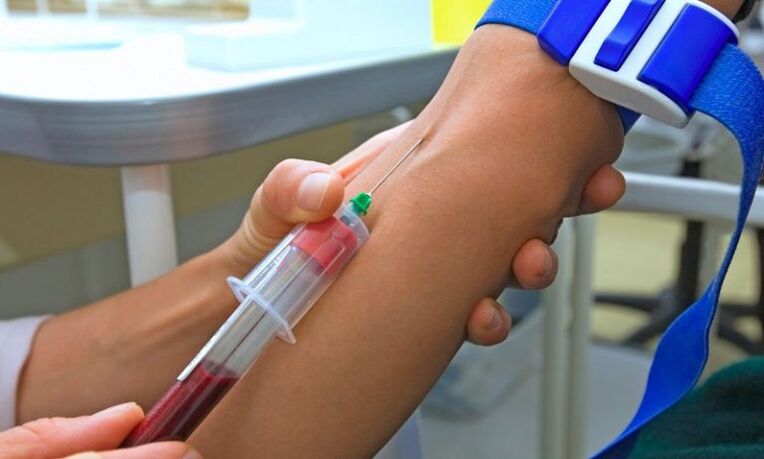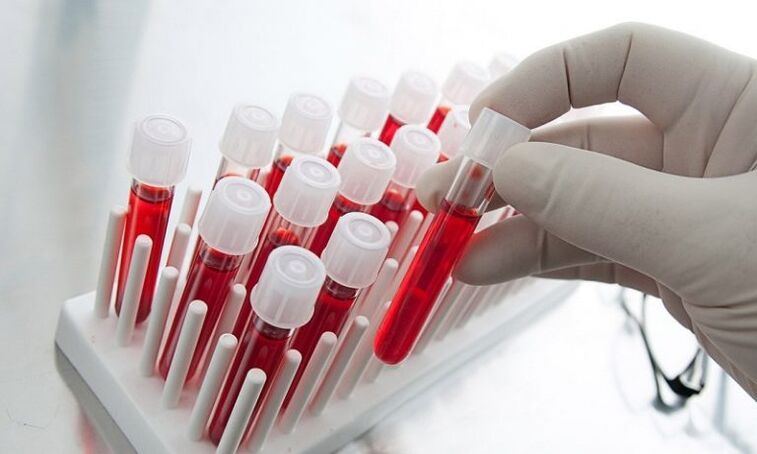Diagnosing inflammation of the prostate is currently a very simple procedure for the doctor. Apart from rare atypical forms of the disease, acute prostatitis is relatively easy to diagnose.

In the treatment of the disease, the patient must undergo a number of laboratory and instrumental tests. Patients are often interested in why they should have a general PSA blood test for prostatitis. Not everyone understands the role of this marker in diagnosing the underlying disease.
What is PSA?
Prostate specific antigen (PSA) is a special glycoprotein that is produced exclusively by cells in the prostate gland. Its main role is to liquefy sperm and activate sperm during ejaculate formation.
This protein is found in the blood and because it is only produced in the prostate, it partly shows its function and all sorts of changes.
It is widely used to diagnose diseases such as:
- Chronic prostatitis;
- Benign prostatic hyperplasia - prostate adenoma;
- Malignant neoplasms of the male organ - prostate cancer.
A general PSA blood test for chronic prostatitis may show a progression of the disease and a dangerous complication of the disease, manifested by degeneration of the damaged cells into atypical cancer with the development of prostate cancer.
A prostate-specific antigen is a tumor marker that may indicate the presence of a tumor in its early stages of development.
Normal indicators
Because the protein is synthesized in the tissues of the male gland, the presence of small amounts in the blood is the norm. The screening threshold for normal tumor marker activity is up to 4 ng / ml in the blood.

The amount of protein depends directly on the following factors:
- The man's age. There is some correlation between patient age and gland marker production activity;
| Age, years | PSA index, ng / ml |
| 40-49 | 2. 5 |
| 50-59 | 3. 5 |
| 60-69 | 4. 5 |
| >70 | 6. 5 |
- regularity of sexual intercourse;
- Presence of an inflammatory process in the prostate;
- Physical trauma and organ damage;
- Delayed surgeries or special diagnostic procedures (prostate massage, digital rectal examination);
- Taking medication.
All of these considerations can affect the number of antigens in your bloodstream and can sometimes confuse even doctors. Therefore, it is necessary to know how to properly pass the PSA blood test for general male prostatitis in order for further therapy to be successful.
PSA preparation
Before a man can give blood to detect a prostate-specific antigen, he must adhere to some important points to prevent misinterpretation of the end result.

To avoid laboratory errors, the patient should consider the following characteristics:
- Do not eat for 8 hours before taking the blood. You can drink tea, juice or water.
- Avoid cycling, stationary cycling or long-distance hiking (>5 km) 24 hours before the start of the study.
- You should refrain from sexual intercourse and masturbation, and from consuming spicy and smoked foods for 1 week prior to the test.
- If the patient has undergone transrectal prostate ultrasound (TRUS), rectal digital examination, colonoscopy, or bladder catheterization, wait at least 7 days before determining PSA in the blood.
- Wait 2 weeks after a prostate biopsy or prostate massage.
Only if these rules are followed can it be said that a PSA blood test for general prostatitis will be truly reliable.
Decoding and purposes of PSA tests
The main purpose of such a test is to monitor the course of the chronic form of the disease and to quickly identify the problem if a malignancy (tumor formation) of the prostate occurs.
In diseases such as acute, chronic, bacterial, congestive prostatitis, PSA levels may increase slightly to 5 ng / ml. This is not yet a cause for panic. If the indicator does not return to normal after appropriate drug therapy, this is considered an absolute indication for organ puncture with subsequent histological examination.
Normally, the larger the volume of the prostate, the more cells are able to produce glycoprotein. It is clinically proven that 1 gram of organ parenchyma also synthesizes 0. 35 ng / ml of antigen in benign hyperplasia. The same rate for cancer is 3. 5 ng / ml.
This ratio allows physicians to judge with high confidence the possibility of developing malignancies in chronic inflammation of the prostate. According to statistics, 83% of cancer patients suffered from chronic inflammation of the male gland at the same time. This allows us to view this pathology as a predictor of cancer.
Conclusion
Blood testing for PSA in prostatitis is part of the mandatory examination of urological patients. Its significance can hardly be overestimated, as it can reliably indicate the development of atypical cell growth leading to the development of malignancies.
























